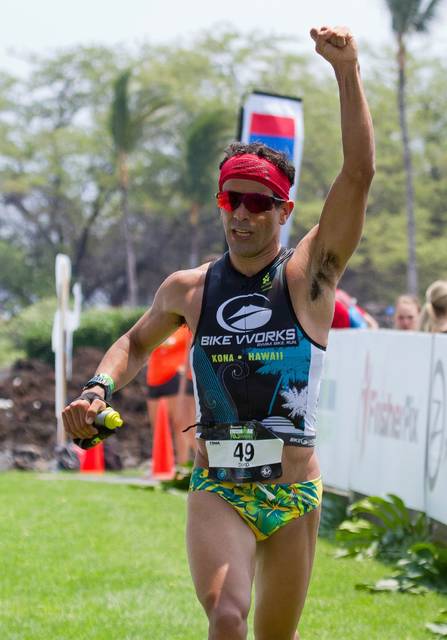Runnin’ with Rani: Ironman Athlete Q&A, Kona’s David Wild

It’s almost “go time.”
It’s almost “go time.”
There’s just five weeks remaining until the cannon booms over beautiful Kailua Bay signaling the start to the world’s most ferocious one-day triathlon event — Kona’s Ironman World Championship.
As race day nears, athletes are in the midst of some massive training weeks as they prepare to swim 2.4 miles, bike 112 miles, and run 26.2 miles consecutively, and all within a 17 hour cut off time.
Top tier professionals may spend upwards of 40 hours per week training for the 140.6-mile race, while many amateurs may log between 20 to 30 hours per week along with juggling a full-time job and family.
These training weeks leading up to the “Big Dance” slated for Oct. 13 can be extremely brutal — both physically and mentally — yet an extraordinary 2,000-plus athletes make it happen every year and this time around will be no different.
Heading into the 40th anniversary of the world championship race, I had the pleasure of catching up to Big Island’s David Wild, who will be making his debut at the infamous Kona start line.
Wild shared his thoughts on competing on his hometown turf, finding time to train while working and being XC head coach, what he enjoys most about his training sessions, and what crossing the finish line will mean to him.
Q: How does it feel to compete in your first Ironman World Championship race in your hometown?
It is quite surreal to think that I’ll be in the mix this year instead of on the sidelines. I did love blasting my boom box on my bike cheering on all the incredible athletes last year, but this year I’m stoked to race my heart out for my students and community.
Q: Most would consider holding down a full-time job while training for the Ironman World Championships an incredible feat as is, but you are also the head coach for the Konawaena boys and girl’s cross-country teams and a triathlon coach for several athletes. Where do you find the time to train?
Thanks! I wake up at 5 a.m. everyday, including the weekends. I train before and after school and I usually go big on the weekends. Now that cross-country season has started with our meets on Saturdays, I’m shifting my long rides to Sundays. The key is planning out my week with pencil and paper to the hour every single day. I make sure to schedule in mandatory chill time too. Being flexible and never hard on myself if I miss a workout is the key to keeping it sustainable.
Q: You have excelled over the last few years in shorter Olympic Distance triathlons and half-Ironman races. What made you want to compete in a full Ironman distance triathlon?
I loved the Honolulu Marathon when I first did it a few years ago. I love riding long. And the glorious hour-long swims in the ocean are like therapy to me. Putting it all together in one day is just a celebration of all the ways I love to express my body.
Q: What aspect of training do you enjoy the most? Which part the least? Are there any challenges that have come up?
I love training and running into friends or acquaintances in the middle of a hard session. I can be in my own world for hours and then suddenly see a coworker, a student, a friend and then I’m quickly reminded how small our island is and how important community is. Training with friends and sharing the beauty of this island together is the most enjoyable. It can be challenging when I miscalculate proper fueling on a hot day and the winds are against me.
Q: What do some of your big training weeks look like? Hours, distances, etc?
I don’t go too big actually. I train about 15 hours a week on average. At my peak, which is coming up soon, I’ll top out at about 40 miles of running, 10 hours of cycling, and six hours of swimming in a week. This Sunday, I did a 6.5-hour training day with all three disciplines — that was fun!
Q: Being that you are a triathlon coach, are you self coached for this Ironman?
I am currently coached by Purple Patch Fitness, a virtual training program that provides me with weekly programming, educational resources, and some feedback.
Q: What will crossing the finish line mean to you?
Really it’s about crossing the start line for me. Getting to be able to even do this sport at all is the biggest blessing. Each stroke in the water, each revolution of the gears on the bike, each step on the run — that is what brings me true gratitude.
I want my students, friends, and family to see that. It’s not the finish line that is the success — it’s the drive and focus in each step of this process of bettering myself that I want them to be inspired by. Getting to the finish line will be amazing of course, but I’m not even thinking about the end yet.


